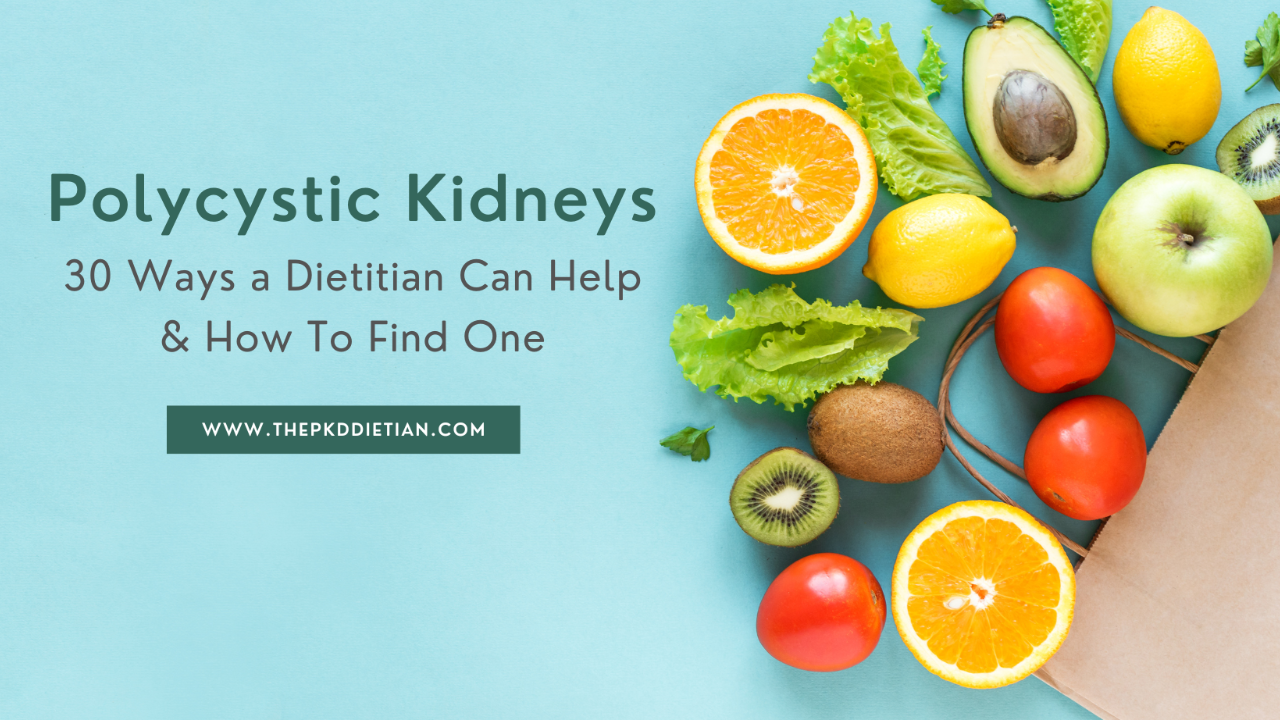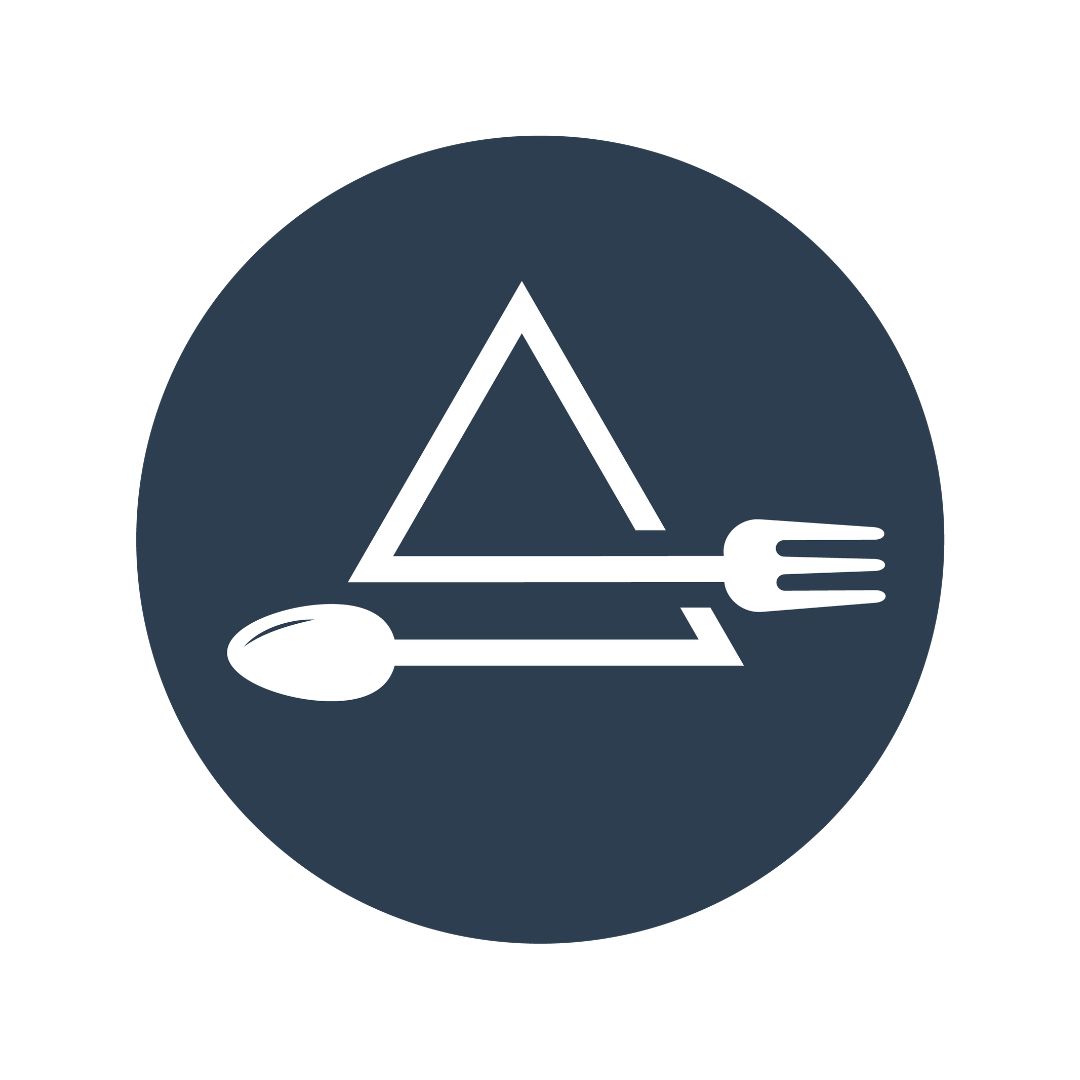
Polycystic Kidneys: 30 Ways a Dietitian Can Help & How to Find One
Apr 17, 2023What you eat, and drink, plays a role in your kidneys’ workload, their health, and the progression of Polycystic Kidney Disease (ADPKD). There are Dietitians who specialize specifically in kidney health, and nutrition, that can help you be your best PKD self.
In this blog, you will learn what a Dietitian is, how an RD can help with PKD, and how to find a Renal Dietitian near you. Keep reading for 30 things a renal dietitian can help you with!
What is a Dietitian (RD)?
Ever wondered what the credentials "RD" mean? RD is short for Registered Dietitian, you will also find RD referenced as RDN, which stands for Registered Dietitian Nutritionist. They are one and the same! Much like becoming an MD or an RN, there is specific education required, training, and a board exam to become credentialed as a Registered Dietitian.
Becoming an RD
Prior to taking that RD Board Exam, every Dietitian must:
- Complete a Master’s Degree (MS)* from an accredited university program. The curriculum includes but isn’t limited to, nutritional sciences, microbiology, behavioral sciences, food service, pharmacology, culinary arts, biochemistry, and anatomy and physiology. There is a reason it's called a Master of Science!
- Complete an internship that includes clinical rotations, community healthcare, and food service (my least favorite rotation!). Dietitian Internships include at least 1200 supervised hours and are typically six months to a year long.
- It is only after graduating from school, and completing a dietetic internship, that someone qualifies to even sit for their Certified Dietitian Exam (CDR). Once passing the exam, it is then, and only then, that someone is credentialed as a Registered Dietitian.
- Additionally, every RD must participate in, and complete 75 professional hours of continuing education every 5 years to maintain their license.
* As of January 1, 2024
As you can see, becoming a Registered Dietitian Nutritionist requires extensive schooling, training, and hands-on experience on the path to becoming a food and nutrition expert. This prepares Dietitians to provide nutritional counseling and medical nutrition therapy (MNT).
Getting a Dietitian on Your Team
Dietitians play important roles on your PKD Healthcare team. One of their key roles is to provide Medical Nutrition Therapy (MNT).
Medical Nutrition Therapy includes an initial assessment, a plan for your diet and health, ongoing counseling, and nutrition therapy specific to your needs.
Getting A Referral
When ordered by a physician, most insurance companies will cover, or reimburse, for services with a qualified Dietitian. If your MD does not have an RD on their team or one they refer out to, you can find one and ask for a referral to be sent to them. Most dietitians have a referral form they can send your MD to fill out.
Check out NIDDK’s CKD Diet Counseling (MNT) Referral Form, this is a good example of the basic information a referring physician needs to provide when referring someone for Medical Nutrition Therapy (MNT).
Insurance Coverage
With a diagnosis of PKD, you qualify for MNT services. Medicare, with a diagnosis of CKD or PKD, covers 100% of the cost of working with a Dietitian. Coverage for MNT is 3 hours, total, the first year and 2 hours each additional year after that. Not enough if you ask me, but at least a start.
Most commercial insurance follows the same MNT coverage protocol as Medicare. If there is an RD you want to work with and they don’t accept insurance, they can provide you with a superbill, essentially a receipt, to submit for reimbursement.
Health Savings & Flexible Spending Accounts
Many Dietitians, including those who work virtually online, accept HSA and FSA account payments. It is always best to ask first and work with your Dietitian regarding payment options. For more on insurance coverage and working with a dietitian, check out this blog at Plant Powered Kidneys on Insurance Coverage & Dietitians.
How an RD Can Help
A Dietitian is more than someone who just “tells you what to eat”. Working with a Renal Dietitian, an RD who specializes in kidney health and nutrition, can help you manage ADPKD, preserve kidney function, delay progression, prevent and treat complications, clarify your best nutrition strategy, and really improve your quality of life.
What To Work On
Here are just a few things you can work on with a Dietitian.
- Slowing your progression of Polycystic Kidney Disease
- Reducing kidney stressors, specific to PKD and your kidneys
- Blood pressure management
- Reducing proteinuria (protein spilling in your urine)
- Weight loss and maintenance
- Good Hydration Habits
- Optimizing your nutrition - proactive PKD Nutrition!
- Anemia - prevention, and correction
- Kidney Stone Prevention
- Oxalate management
- UTI prevention, better urinary markers
- Inflammation - along with it often a reduction in pain
- Gut health
- Bone Heath - keeping bones balanced or helping correct an imbalance
- Reducing Uric Acid, Gout
- Upleveling diet with supplements
- Medication recommendations
- Menu planning, recipe creation, and swaps
- Ketogenic Therapy, Intermittent Fasting
- Macronutrient balance (protein, carbs, fat)
- Vitamins & Mineral - ensure no deficiencies
- Sodium, potassium, phosphorus
- Putting dietary positives in place to support kidney health
- Mindset shifts
- Heart health, healthy fats
- Lab review and assessment, plus recommendations for additional monitoring
- Taking a medical food, like KetoCitra
- Education
- Reducing uremic toxins, waste
- Support, accountability, and clarity!
Dietary changes aren’t just about what you take away, it's also about what you include! Plus, what is good for you, and supports your PKD kidney health, can change, especially if you have a change in kidney function or a new diagnosis. Your diet can positively, or negatively, affect your kidneys and health.
How To Find a Renal Dietitian
I highly recommended, when working on your nutrition for PKD, to work with a Renal Dietitian! They are going to understand, and be able to support you, with more specifics about your kidney's health and nutrition therapy. Working with someone who gets kidney health is important.
Now I know what you are thinking…but they don’t know or focus on PKD?
I can’t speak to what other Renal Dietitians know or don’t know, about Polycystic Kidney Disease, but it is a good starting point for help that is kidney specific. Beneficial Nutrition for PKD & CKD overlap in some areas and this is where you can focus on up-leveling your diet.
If you find a Dietitian who you like working with but they aren’t up-to-date on PKD, send them my way, to The PKD Dietitian. I am building up resources, and training for fellow Dietitians. It is a mission, and goal of mine to educate fellow Dietitians on nutritional interventions and opportunities specifically for PKD. To spread awareness within healthcare about opportunities to slow the progression of Polycystic Kidney Disease.
The Best Search Engines
The two best resources to find a dietitian near you are:
- National Kidney Foundation’s CKD Dietitian Database.
- Just pick the region you live in and NKF provides you with a list of RDs in your area.
- The Academy of Nutrition and Dietetics Find a Nutrition Expert directory.
- Type in your zip code,
- Select the “kidney disease & renal” box
- You can filter by if someone accepts insurance or not
Other Options
- Ask your Nephrologist if they work with a Kidney Dietitian, if they do, a direct referral can be made for you to that RD.
- Check out Heathprofs.com. First, select “nutritionist and dietitians” from the drop-down menu, then enter the city, zip, or name of the place you live. From the left-hand menu, under “ISSUES” select “Renal Issues” and you can check out local RD options.
In Summary
There are so many benefits to having a Dietitian on your PKD Healthcare Team. Finding an RD who you like, who is available to you, and for you is key. I highly recommend if we can’t work together, to seek out a Renal Dietitian. After all, your kidneys are bad a$$, and nutrition to help support them should be individualized for what you need and to you.
PKD isn’t CKD. Your nutrition plan should be specific to PKD too. Check out your options to work with me, The PKD Dietitian. Not only do I specialize in kidney nutrition and health, but I am the PKD Nutrition expert!
Your Advocate,
Diana, The PKDietitian



